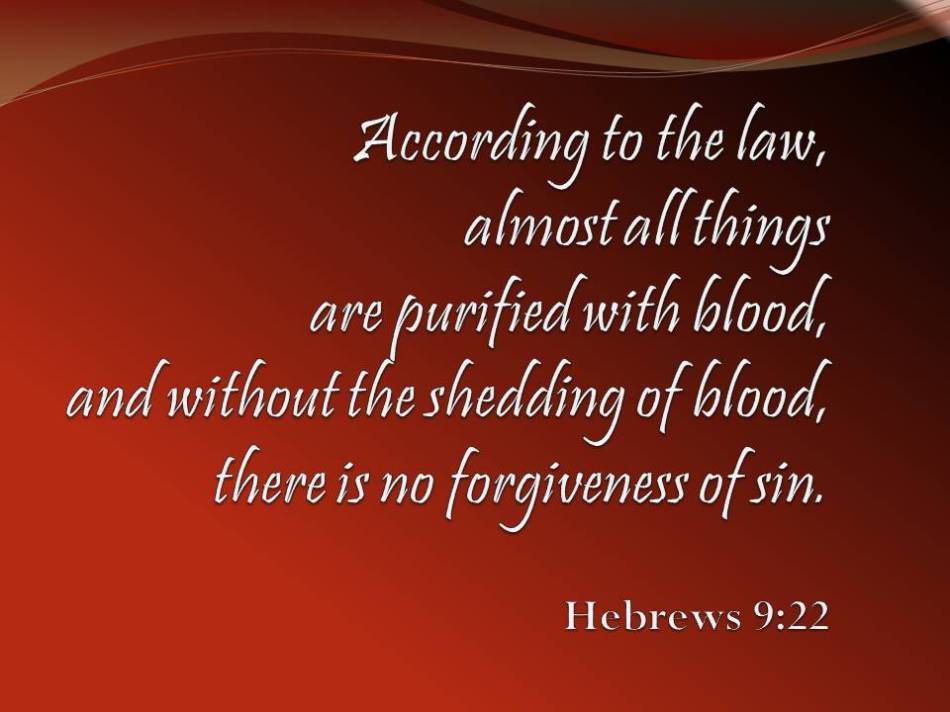Tracing Yeshua’s Blood From the Cross to the Ark – Part 3

If you know YHVH even a little bit, you know he is holy and has set up all of his Torah instructions for a reason. He has and will continue to fulfill all of his own instructions until heaven and earth pass away. So we understand from the instructions for the Day of Atonement that to fulfill the law, Yeshua’s holy blood has to be put on the Ark of the Covenant in the heavenly temple.
Have you thought about when and how Yeshua’s blood shed at Passover might have been put on the ark?
(more…)Month 7 – The Feast of Trumpets & the New Moon
 What’s the only feast that falls on a new moon? Feast of Trumpets! The Feast of Trumpets always begins on Tishrei 1, the beginning of the seventh month on the Hebrew calendar. It’s always marked by a new moon.
What’s the only feast that falls on a new moon? Feast of Trumpets! The Feast of Trumpets always begins on Tishrei 1, the beginning of the seventh month on the Hebrew calendar. It’s always marked by a new moon.
Genesis 1:14 tells us:
“Then God said, ‘Let there be lights in the expanse of the heavens to separate the day from the night, and let them be for signs and for seasons and for days and years;'”
Feast of Trumpets: “A day of complete rest for remembering”
 On the Feast of Trumpets (also called Rosh Hashanah) we put aside our work and gather with other believers, share a meal, blow our shofars, present an offering and worship just as Yehovah commanded us in Leviticus 23.
On the Feast of Trumpets (also called Rosh Hashanah) we put aside our work and gather with other believers, share a meal, blow our shofars, present an offering and worship just as Yehovah commanded us in Leviticus 23.
But Leviticus 23:24 also tells us this is to be “a day of complete rest for remembering.” Remembering what, it doesn’t say. In fact none of the references to the Feast of Trumpets tell us what we’re remembering.
To get some perspective, let’s go back in time about 3,500 years when the observance of this day was first commanded. (more…)
Our Calling This Shemitah Year, Part 1: The 5 Primary Events of Wrath
 In 2014, the Feast of Trumpets kicked off the Shemitah year. Nine days later was the Day of Atonement (Yom Kippur), and just three days after that the second of four blood moons occurred. The Feast of Trumpets, The Day of Atonement, the Shemitah year, the tetrad of blood moons – what do all these have to do with each other? What do they have to do with us? And what can we do to participate in God’s plan? (more…)
In 2014, the Feast of Trumpets kicked off the Shemitah year. Nine days later was the Day of Atonement (Yom Kippur), and just three days after that the second of four blood moons occurred. The Feast of Trumpets, The Day of Atonement, the Shemitah year, the tetrad of blood moons – what do all these have to do with each other? What do they have to do with us? And what can we do to participate in God’s plan? (more…)
Why celebrate all these Jewish holidays? Haven’t those been done away with?
There are seven Feasts or Holy Days commanded in the Bible – four in the Spring, and three in the Fall. It’s true, Jews had been observing these Feasts for 1,400 years before Yeshua’s birth. But what if Yehovah set those dates as days He intends to fulfill specific prophecies in Yeshua’s lifetime and His second coming? Wouldn’t you want to know which dates those were? Let’s recount what happened on the Spring Feast dates during Yeshua’s lifetime. (more…)
Thank Goodness for The Feast of Tabernacles!
 A pandemic, economic uncertainty, fear, division – the headlines bombard us. The low level hum of a looming turmoil grows louder. Thank goodness for The Feast of Tabernacles!
A pandemic, economic uncertainty, fear, division – the headlines bombard us. The low level hum of a looming turmoil grows louder. Thank goodness for The Feast of Tabernacles!
The Feast of Tabernacles, called Sukkot in Hebrew, is the seventh and last Feast in God’s holy days. It looks back to God’s unlimited provision for the Israelites as they sojourned 40 years in the wilderness. During the seven days of Sukkot, we spend time in our flimsy, homemade shelters to remind us of our complete dependence on God. Sukkot also looks forward to the Millennial Age where we will “tabernacle” with Yeshua eternally.
But there’s an often overlooked aspect to this Feast. (more…)
The Feasts of the Lord: Going Through the Motions
 Passover, Feast of Unleavened Bread, Feast of First Fruits, Pentecost, Feast of Trumpets, Day of Atonement, Feast of Tabernacles – lots of Feasts, each with different instructions for observing them. Sometimes when we’re just starting out observing the Feasts, or approach a new season of Feasts, we can easily think of all the instructions and do’s and don’ts, and forget the richness of each Feast. It can feel – and in fact become – like we’re just going through the motions.
Passover, Feast of Unleavened Bread, Feast of First Fruits, Pentecost, Feast of Trumpets, Day of Atonement, Feast of Tabernacles – lots of Feasts, each with different instructions for observing them. Sometimes when we’re just starting out observing the Feasts, or approach a new season of Feasts, we can easily think of all the instructions and do’s and don’ts, and forget the richness of each Feast. It can feel – and in fact become – like we’re just going through the motions.
I can imagine that’s how the Hebrews must have felt when they heard the instructions for the first time as well. Exodus 12 is 50 verses full of instructions for Passover and the Feast of Unleavened Bread. And the instructions are not exactly intuitive or logical. What were they to make of killing a lamb and smearing its blood on their door frames? Had that ever saved them from death before? Was this a common practice? And what’s so bad about leavened bread? What does that have to do with saving their firstborns? (more…)
Preparing to Enter Our Promised Land – Part 2
 In Numbers 1-2 God appoints leaders from each tribe of the Israelites, counts the men for military battle and organizes them as to how they are to camp and move. By Numbers 10 they are moving toward the Promised Land. These are our bookends in this study. Everything within this 20-day period can be considered the last minute instructions before the Israelites can move forward.
In Numbers 1-2 God appoints leaders from each tribe of the Israelites, counts the men for military battle and organizes them as to how they are to camp and move. By Numbers 10 they are moving toward the Promised Land. These are our bookends in this study. Everything within this 20-day period can be considered the last minute instructions before the Israelites can move forward.
In Part 1, we referenced Hebrews 3-4, in which Paul points out,
“it still remains for some to enter that rest, and since those who formerly had the good news proclaimed to them did not go in because of their disobedience, God again set a certain day, calling it ‘Today.’ ” … “There remains, then, a Sabbath-rest for the people of God;”
The last minute preparations in how to enter our Sabbath rest in these last days are the same for us as they were for the Israelites in Numbers 1-10. These are our instructions for what is required in order for God to fulfill His promises to us. (more…)
Preparing to Enter Our Promised Land – Part 1
Numbers 1 begins the culmination of God’s main purpose for the Exodus: entering the Promised Land. Hebrews 4 tells us we are still headed for the Promised Land, calling it our Sabbath rest. Numbers 1-14 are the last few weeks before His grand plan is finally realized. The first 10 chapters provide an outline of how to prepare to enter the Land – for the Israelites, and for us today. These are the last few instructions for following God’s presence into our land of blessing and abundance. (more…)
The Spring Feasts: A Time to Remember, A Time to Anticipate
 Typically we think of the Spring Feasts as a time to remember – the Exodus and Yeshua’s death on Passover, his resurrection on the Feast of Firstfruits, the giving of the Torah and the Holy Spirit on Pentecost.
Typically we think of the Spring Feasts as a time to remember – the Exodus and Yeshua’s death on Passover, his resurrection on the Feast of Firstfruits, the giving of the Torah and the Holy Spirit on Pentecost.
Then, we think of the Fall Feasts as a time to anticipate – Yeshua’s return on the Feast of Trumpets, the Lamb’s Book of Life opening on the Day of Atonement and tabernacling with Yeshua on the Feast of Tabernacles.
However, I found there’s also more to anticipate in the Spring Feasts. There’s more to come. The remembering helps us understand what to anticipate in the future. (more…)
God’s Blessing and Provision, Part 2: We’re in the Family of The Provider
 In my last blog post I discussed the balance between stewarding our resources while remaining completely dependent on God during the increase in economic instability or political turbulence, civil unrest and especially natural disasters.
In my last blog post I discussed the balance between stewarding our resources while remaining completely dependent on God during the increase in economic instability or political turbulence, civil unrest and especially natural disasters.
A wonderful example of this principle is Joseph. His leadership during the great famine of his time not only demonstrates his response to and preparation for hard times, but has additional significance for us today because of the fact that he is a foreshadow of Yeshua Himself. I believe Joseph’s story provides us a glimpse of what’s ahead for Yeshua’s followers as end-time events escalate. (more…)
God’s Blessing and Provision, Part 1: There’s More Where That Came From
 With today’s fears over Covid 19, economic instability, civil unrest, random violence, political mayhem and natural disasters, it seems the Bible’s prophecies are now daily headlines.
With today’s fears over Covid 19, economic instability, civil unrest, random violence, political mayhem and natural disasters, it seems the Bible’s prophecies are now daily headlines.
Fear of the possibilities, or even fear born from first-hand experience, can creep in and begin to change our mindset and our focus. It’s easy to start making a plan for our security: saving more money, storing up food and supplies, buying additional insurance, making plans for various disaster scenarios, and the list goes on — all good considerations and wise counsel.
But there’s a danger even in our planning: pursuing our own plan for security can take us away from God’s. The very things we amass to keep us secure can begin to replace the true source of not only our security, but the source of all those things we’re gathering. When we take our eye off the Source, the result is more fear of the unknown and more worry about protecting it all. Before we know it, the provisions become our security instead of the One who provided them.

